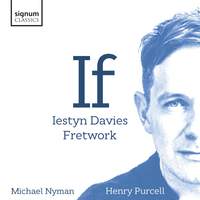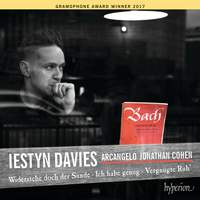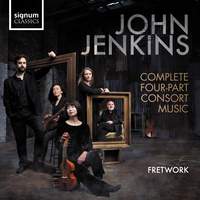Interview,
Iestyn Davies on Michael Nyman and Henry Purcell
 Iestyn Davies's name is hardly obscure among music fans - an impressive discography both of solo albums and of collaborations in larger works, particularly Handel and Bach, attests to his musicianship. The same is true of viol consort Fretwork, who have appeared on period-film soundtracks, presented Renaissance chamber music, and explored new writing for these forces.
Iestyn Davies's name is hardly obscure among music fans - an impressive discography both of solo albums and of collaborations in larger works, particularly Handel and Bach, attests to his musicianship. The same is true of viol consort Fretwork, who have appeared on period-film soundtracks, presented Renaissance chamber music, and explored new writing for these forces.
Hitherto, though, Davies and Fretwork had never actually appeared together on a recording; this album bringing them into musical partnership is a striking blend of old and new, teasing out the relationship between Henry Purcell and Michael Nyman in words and music. I spoke to Iestyn about this fascinating programme, and about the circumstances that have helped to shape it.
Although you and Fretwork are both well-established figures in the early music scene in your own right, you don’t appear to have actually recorded together before. Can you tell us a little bit about how this project came to be?
Very simply an email, an answer and a plan! I hope it won’t be a surprise to most people if I said that there isn’t really such thing as a scene, or some kind of world behind an embroidered tapestry where early music folk lurk around, avoiding the bright lights of contemporary music. In fact if I grab my diary for the past few years I don’t think I’ve appeared in more than one or possibly two events that could be classed as ‘on the scene’. So to this end, Fretwork and I came together for this project not for a lack of things to do on the scene but as active performers in our own right, regardless of the period of music we have been performing. One can’t help how that connection is perceived, but in all honesty Richard Boothby proposed this programme based around the Nyman and in particular wanting to have another stab at the Hymn to Inanna. Yes, they play on instruments of historic interest, but we’re well past the day when their existence in the modern concert hall is a novelty. This felt like any other project on which I’ve collaborated.
On the face of it, the combination of contemporary music and baroque seems rather chalk-and-cheese, but Nyman’s background as a musicologist and composer does point to a certain affinity with Purcell. From a performer’s perspective, do you feel there’s a similarity between Nyman’s music and Purcell’s?
Whenever we put music into boxes like ‘contemporary’ and ‘baroque’ it immediately invites unnecessary comparisons that aren’t necessarily relevant to the music in question. I’m always at odds with this obsession with how things ‘should’ be done or what is ‘right and wrong’; baroque music is always a victim of this. You have to be fearless as a performer and at times that means accepting that we exist today, now and in the moment of a twenty-first-century world where many things have existed for much of written history; most of our daily lives interact with culture, tradition and material that is deeply embedded in this abstract sense of a past. Therefore, I think a relevant response to ‘ancient’ music is to give a performance that is timeless; one that engages with emotion and expression, engages with the meaning of the text and connects with a living, breathing twenty-first-century audience; in doing so we instantly strip away the straitjacket that is ‘time’.
In a roundabout way, I’m also arguing that there’s not a necessity to find something in Nyman’s music that isn’t necessarily there. I don’t, as a performer, think of Purcell when I perform Nyman – I think of Nyman. Of course, the emotional response to the music will no doubt be wrapped up in my own experience of singing all other music, including Purcell; perhaps that elicits a reaction from the listener that reminds them of Purcell, but to that end it is out of my control. I’d like to think Nyman has his own voice. The connection with Purcell in this programme can be seen as very literal – Nyman resets some of Purcell’s themes deliberately with titles such as 'Music after a while' – but this is not a new exercise (see Britten, Tippett and Adès, for example). I don’t want to make too obvious comparisons such as ‘his music is equally melancholic’, simply because you could say that about many composers and it distracts from the real focus which is Nyman and his own voice.
Before pursuing a career as a singer, you initially studied archaeology and anthropology; what did you make of Nyman’s striking setting of an ancient Sumerian hymn to Inanna (known to later civilisations as Ishtar)?
I first heard it in Fretwork’s recording with James Bowman. The composer Nico Muhly slapped it on one night over drinks at around 2am and said ‘You haven’t heard this!??’, and much merriment ensued. It’s bizarre and difficult to sing, but hugely rewarding as a whole and I think dramatic enough to be quite startling to an audience. There’s a section in the middle that reminds me of Led Zeppelin, with a riff-heavy, rhythmic pattern. There’s declamatory wailing at the opening, and the busyness of the viol parts that brings together the focus of the ensemble in moments of potential crisis and strife is moving. As a former archaeology student, it reminds me of the chaos of material history: at times layered and complex, and beyond comprehension. There are always many stories to be found and told, and we ultimately choose which one we follow; in performing any composition there is a balance to be struck between following the will of the composer on the page and following one’s interpretation.
We seem to be enjoying a golden era of new compositions for 'old' groups – several recent albums have been devoted, at least in part, to exploring the sonorities of various Renaissance consorts. Do you think this is just a coincidence, or have those ensembles now become mainstream enough to attract composers’ attention?
Yes, I hope it is coincidence! If not, there are some predictable forces at work which makes life less interesting. I believe that perhaps it’s not so unusual to see ‘old’ instruments gracing concert platforms and that their ‘availability’ to both ensembles and composers alike has subconsciously made its mark. I don’t think composers would say they were writing something to give somebody with an old instrument something to do: for example, I genuinely think George Benjamin heard a viola da gamba pour out of his mind when he put pen to paper in writing his hugely successful opera Written on Skin. Of course there is context, and in that example there was a very ancient story being told, but the sound-world was more important to the composer than an academic exercise in sign-posting ‘historic instrument klaxon!!’
Composers, I imagine, think a bit more laterally; it seems to me that to compose you have to let your subconscious come to the fore, and that means shedding much of what you know at that time and think you should do. Great pieces are the result of that happy combination of originality laced with unintentional familiarity for which there is no equation; as Thomas Adès once said in an interview, writing for a specific instrument or ensemble is much more limiting in terms of creativity than just writing music itself. I love the sound of a viol consort more than most things, but when I hear them play Byrd, Dowland or Purcell it is the music which speaks to me, not the historic finery. Likewise with a contemporary composition for the viol consort; if one comes at it with the mindset that you are writing for a ‘historic’ thing it’ll sound like that and that to me misses the point of why we perform and enjoy performing music.
If was released on 22nd March 2019 on Signum.
Available Formats: CD, MP3, FLAC, Hi-Res FLAC
Iestyn Davies's account of three great solo cantatas by JS Bach, with the Arcangelo ensemble under Jonathan Cohen, was released in December 2016 on Hyperion and won the Baroque Vocal category at the following year's Gramophone Awards.
Available Formats: CD, MP3, FLAC, Hi-Res FLAC
One of the most-performed composers of his time, John Jenkins produced a large quantity of consort music characterised by sensitively-woven counterpoint and melodic lines. Fretwork's recording of a selection of his Fantasias and Pavanes was released in March 2018 on Signum.
Available Formats: CD, MP3, FLAC, Hi-Res FLAC





